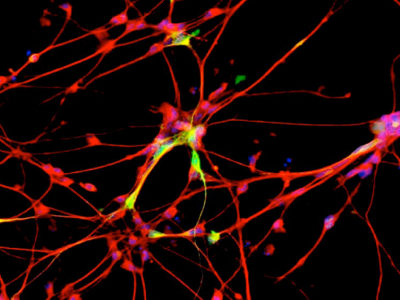«We hope this will be a watershed moment for millions of people living with Parkinson’s disease," says Patrik Brundin, M.D., Ph. D., director of Van Andel Research Institute’s Center for Neurodegenerative Science, chairman of The Cure Parkinson’s Trust’s Linked Clinical Trials Committee, and the study’s senior author. «All of our research in Parkinson’s models suggests this drug could potentially slow the disease’s progression in people as well.»
Until now, Parkinson’s treatments have focused on symptom management. If successful in human trials,
Parkinson’s disease afflicts between 7–10 million people worldwide, including an estimated 1 million Americans, and these numbers are expected to increase dramatically as the average human lifespan increases. There is currently no cure, and
Tom Isaacs, a
«Our scientific team has evaluated more than 120 potential treatments for Parkinson’s disease, and

Dopamine-producing brain cells after treatment with MSDC-0160. Photo courtesy of the Patrik Brundin Laboratory, Van Andel Research Institute.
The novelty of
«Parkinson’s disease and diabetes may have vastly different symptoms with unrelated patient outcomes; however, we’re discovering they share many underlying mechanisms at the molecular level and respond similarly to a new class of insulin sensitizers like
While Brundin says he is eager to see
«This is an immensely promising avenue for drug discovery," says Brundin. «Whatever the outcome of the upcoming trial for Parkinson’s, we now have a new road to follow in search of better treatments that cut to the root of this and other insidious diseases.»
The Cure Parkinson’s Trust and Van Andel Research Institute are currently working with MSDC to address regulatory issues and obtain funding to organize the clinical trial, which Brundin hopes can begin sometime in 2017.
Funding for the research was provided by Van Andel Research Institute, The Cure Parkinson’s Trust, the Campbell Foundation and the Spica Foundation.
The paper’s authors include Anamitra Ghosh, Trevor Tyson, Sonia George, Erin N. Hildebrandt, Jennifer A. Steiner, Zachary Madaj, Emily Schulz, Emily Machiela, Martha L. Escobar Galvis, Jeremy M. Van Raamsdonk and Patrik Brundin, all of Van Andel Research Institute; William G. McDonald and Jerry R. Colca, both of Metabolic Solutions Development Company; and Jeffrey H. Kordower, of Rush University Medical Center and Van Andel Research Institute.


